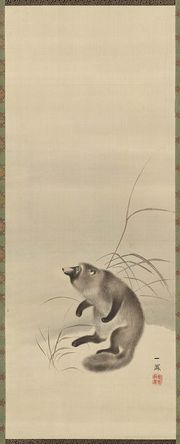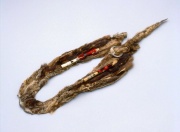Difference between revisions of "Badger hair"
| Line 1: | Line 1: | ||
| − | [[File:Badger painting MFA.jpg|thumb|Badger | + | [[File:Badger painting MFA.jpg|thumb|Badger on a scroll<br>MFA# 11.4724]] |
[[File:1984.322-SL26822.jpg|thumb|Ceremonial collar<br>MFA #: 1984.322]] | [[File:1984.322-SL26822.jpg|thumb|Ceremonial collar<br>MFA #: 1984.322]] | ||
== Description == | == Description == | ||
Latest revision as of 13:21, 1 May 2022
Description
Soft, silky fibers obtained from the guard hairs of several species of badger from the family Mustelidae, particulary the Eurasian badger (Mele meles). Badger hair is usually white on both ends with a dark band in the middle. High quality badger hairs are produced for artist brushes in China, Asia Minor, the Balkans, and Russia. Badger hairs are used for fan shaped blenders and bushy rounds that are often mounted in Quill ferrules (Pinney 1999). Imitation badger hair brushes are made by dyeing less expensive fur fibers, such as ox ear hair. Badger fur has also been used for mats.
Synonyms and Related Terms
Eurasian badger (Mele meles); American badger (Taxidea taxus); brock; Dachs (Deut.); tejón (Esp.); blaireau (Fr.); dassen (Ned.); Borsuk (Pol.); texugo (Port.); grävling (Sven.)
Physical and Chemical Properties
- Striped black and white, stiff, conical hairs with belly near point and tapered to thin at butt end.
- Lengths up to 4 inches (10 cm).
- Density = 1.09-1.26 g/ml
Additional Images
Resources and Citations
- Encyclopedia Britannica, http://www.britannica.com Comment: "badger" [Accessed October 16, 2003].
- Edward Reich, Carlton J. Siegler, Consumer Goods: How to Know and Use Them, American Book Company, New York City, 1937
- F. Kidd, Brushmaking Materials, Bristish Brush Manufacturers, London, 1957
- Zora Sweet Pinney, 'A Handle on the Terms used for Artists' Brushes', unpublished glossary, 1999
- Wikipedia: http://en.wikipedia.org/wiki/Badger (Accessed Oct. 18, 2005)



